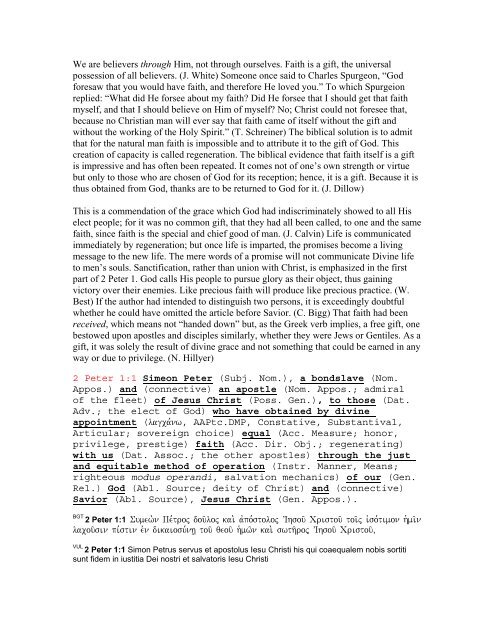2 Peter - Verse-by-Verse Biblical Exegesis
2 Peter - Verse-by-Verse Biblical Exegesis
2 Peter - Verse-by-Verse Biblical Exegesis
Create successful ePaper yourself
Turn your PDF publications into a flip-book with our unique Google optimized e-Paper software.
We are believers through Him, not through ourselves. Faith is a gift, the universal<br />
possession of all believers. (J. White) Someone once said to Charles Spurgeon, “God<br />
foresaw that you would have faith, and therefore He loved you.” To which Spurgeion<br />
replied: “What did He forsee about my faith? Did He forsee that I should get that faith<br />
myself, and that I should believe on Him of myself? No; Christ could not foresee that,<br />
because no Christian man will ever say that faith came of itself without the gift and<br />
without the working of the Holy Spirit.” (T. Schreiner) The biblical solution is to admit<br />
that for the natural man faith is impossible and to attribute it to the gift of God. This<br />
creation of capacity is called regeneration. The biblical evidence that faith itself is a gift<br />
is impressive and has often been repeated. It comes not of one’s own strength or virtue<br />
but only to those who are chosen of God for its reception; hence, it is a gift. Because it is<br />
thus obtained from God, thanks are to be returned to God for it. (J. Dillow)<br />
This is a commendation of the grace which God had indiscriminately showed to all His<br />
elect people; for it was no common gift, that they had all been called, to one and the same<br />
faith, since faith is the special and chief good of man. (J. Calvin) Life is communicated<br />
immediately <strong>by</strong> regeneration; but once life is imparted, the promises become a living<br />
message to the new life. The mere words of a promise will not communicate Divine life<br />
to men’s souls. Sanctification, rather than union with Christ, is emphasized in the first<br />
part of 2 <strong>Peter</strong> 1. God calls His people to pursue glory as their object, thus gaining<br />
victory over their enemies. Like precious faith will produce like precious practice. (W.<br />
Best) If the author had intended to distinguish two persons, it is exceedingly doubtful<br />
whether he could have omitted the article before Savior. (C. Bigg) That faith had been<br />
received, which means not “handed down” but, as the Greek verb implies, a free gift, one<br />
bestowed upon apostles and disciples similarly, whether they were Jews or Gentiles. As a<br />
gift, it was solely the result of divine grace and not something that could be earned in any<br />
way or due to privilege. (N. Hillyer)<br />
2 <strong>Peter</strong> 1:1 Simeon <strong>Peter</strong> (Subj. Nom.), a bondslave (Nom.<br />
Appos.) and (connective) an apostle (Nom. Appos.; admiral<br />
of the fleet) of Jesus Christ (Poss. Gen.), to those (Dat.<br />
Adv.; the elect of God) who have obtained <strong>by</strong> divine<br />
appointment (lagca,nw, AAPtc.DMP, Constative, Substantival,<br />
Articular; sovereign choice) equal (Acc. Measure; honor,<br />
privilege, prestige) faith (Acc. Dir. Obj.; regenerating)<br />
with us (Dat. Assoc.; the other apostles) through the just<br />
and equitable method of operation (Instr. Manner, Means;<br />
righteous modus operandi, salvation mechanics) of our (Gen.<br />
Rel.) God (Abl. Source; deity of Christ) and (connective)<br />
Savior (Abl. Source), Jesus Christ (Gen. Appos.).<br />
BGT 2 <strong>Peter</strong> 1:1 Sumew.n Pe,troj dou/loj kai. avpo,stoloj VIhsou/ Cristou/ toi/j ivso,timon h`mi/n<br />
lacou/sin pi,stin evn dikaiosu,nh| tou/ qeou/ h`mw/n kai. swth/roj VIhsou/ Cristou/(<br />
VUL 2 <strong>Peter</strong> 1:1 Simon Petrus servus et apostolus Iesu Christi his qui coaequalem nobis sortiti<br />
sunt fidem in iustitia Dei nostri et salvatoris Iesu Christi









